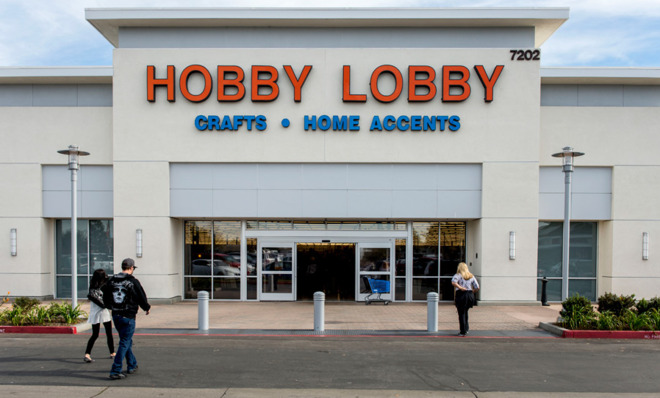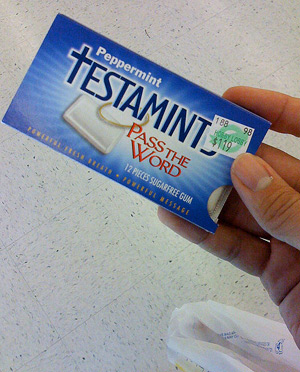Stop calling Hobby Lobby a Christian business
The craft store is exalted by the conservative faithful. But it conducts business in a way that flouts Christian values.


A free daily email with the biggest news stories of the day – and the best features from TheWeek.com
You are now subscribed
Your newsletter sign-up was successful
"We're Christians," Hobby Lobby's president Steve Green proclaims, "and we run our business on Christian principles."
That is music to the ears of many conservative Christians, who rallied around Hobby Lobby when the retail chain argued at the Supreme Court that ObamaCare's contraception mandate unlawfully burdened their religious beliefs. But a closer look at Hobby Lobby's actual business practices reveals this claim to be as hollow as a flute. Turn over just about any trinket in a Hobby Lobby store and you'll find a gold oval stamped with "Made in China," a country that is one of the worst offenders of human dignity, unborn infant life, and economic justice anywhere in the world.
As such, those shiny stickers littering every Hobby Lobby from sea to shining sea are more than a statement about a product's geographical origin; they are also a stinging indictment against the way the retailer has sought to label itself.
The Week
Escape your echo chamber. Get the facts behind the news, plus analysis from multiple perspectives.

Sign up for The Week's Free Newsletters
From our morning news briefing to a weekly Good News Newsletter, get the best of The Week delivered directly to your inbox.
From our morning news briefing to a weekly Good News Newsletter, get the best of The Week delivered directly to your inbox.
Imagine for a moment a nation with nightmarish labor conditions, inadequate workplace regulation, and rampant child labor. You've just imagined 21st century China. Seventy thousand Chinese employees die every year in workplace accidents — that's roughly 200 humans snuffed out of existence every day.
Some provinces in China are raising their minimum wage standards. But don't rush to praise them. Starting this year in Shanghai, minimum wage is rising to only $293 per month — a paltry figure that is still the highest amount paid in all of mainland China. That's about $9.77 per day. If you were wondering how Hobby Lobby can sell wicker baskets for next to nothing, now you know.

China is also the 20th worst in the world for child labor. Can you call yourself a "Christian business" when you support underage labor? Jesus, after all, taught that taking one's own life is preferable to harming a child.
And what of China's one-child policy, which disincentivizes having daughters to the point that it fuels an underground abortion industry? Data shows that 13 million abortions are performed in the country each year. About 35,000 infant lives are terminated in China every day, and 336 million abortions have taken place there over the last four decades. According to Steven Mosher of Population Research Institute, "most of those abortions have the character of a rape. That is, they were performed on women who were ordered, or even physically forced, to submit to the knife."
A free daily email with the biggest news stories of the day – and the best features from TheWeek.com
Perhaps we shouldn't be surprised, then, that China accounts for 19 percent of the global population, but 56 percent of the world's female suicides. Approximately 500 women take their own lives in China every day.
Though China somewhat relaxed its controversial 35-year-old policy recently, Max Fisher of The Washington Post has noted that the policy still leads to forced abortions — in addition to sterilizations and infanticide — and always will.
Now, of course, a huge number of American companies outsource labor to China, and thus help prop up this shameful status quo. But very few of these American companies simultaneously trumpet themselves as "Christian businesses," arguing in court that providing employees with health insurance covering contraceptives violates their religious beliefs. How can this ObamaCare mandate be so foul to Hobby Lobby executives, while they say very little about Chinese policies forcing women to have abortions against their wills? Is abortion wrong only when the terminated life is American?
The most glaring inconsistency between Hobby Lobby's ethical proclamations and its business decisions concerns the matter of religious liberty. The craft store chain is hailed by conservatives as standing up to Uncle Sam and fighting for religious freedom. Yet Hobby Lobby imports billions of dollars worth of bric-a-brac from a nation that denies 1.35 billion citizens freedom of worship.
If Hobby Lobby was concerned with religious freedoms — not just those of conservative American Christians — it would quit doing business in China.
Hobby Lobby reminds us why for-profit businesses should resist calling themselves "Christian." The free market is messy and complicated and riddled with hypocrisy. Conducting business in today's complex global economy almost ensures one will engage in behavior that is at least morally suspect from a Biblical standpoint.
If you want to call your business "Christian," by all means, go right ahead. But those who live by the label must die by it as well. You cannot call your business "Christian" when arguing before the Supreme Court, and then set aside Christian values when you're placing a bulk order for cheap wind chimes.
Every time you buy a decorative platter from Hobby Lobby with a Bible verse stamped across it, you have funded the company's fight against the HHS contraception mandate. But you're also sending a chunk of change to a country that forces people to abort their children, flouts basic standards of workplace dignity, and denies more than a billion people the right to worship.
Image courtesy CC BY: Wouter van Erve
Jonathan Merritt is author of the book Learning to Speak God from Scratch: Why Sacred Words are Vanishing — and How We Can Revive Them and a contributing writer for The Atlantic.



